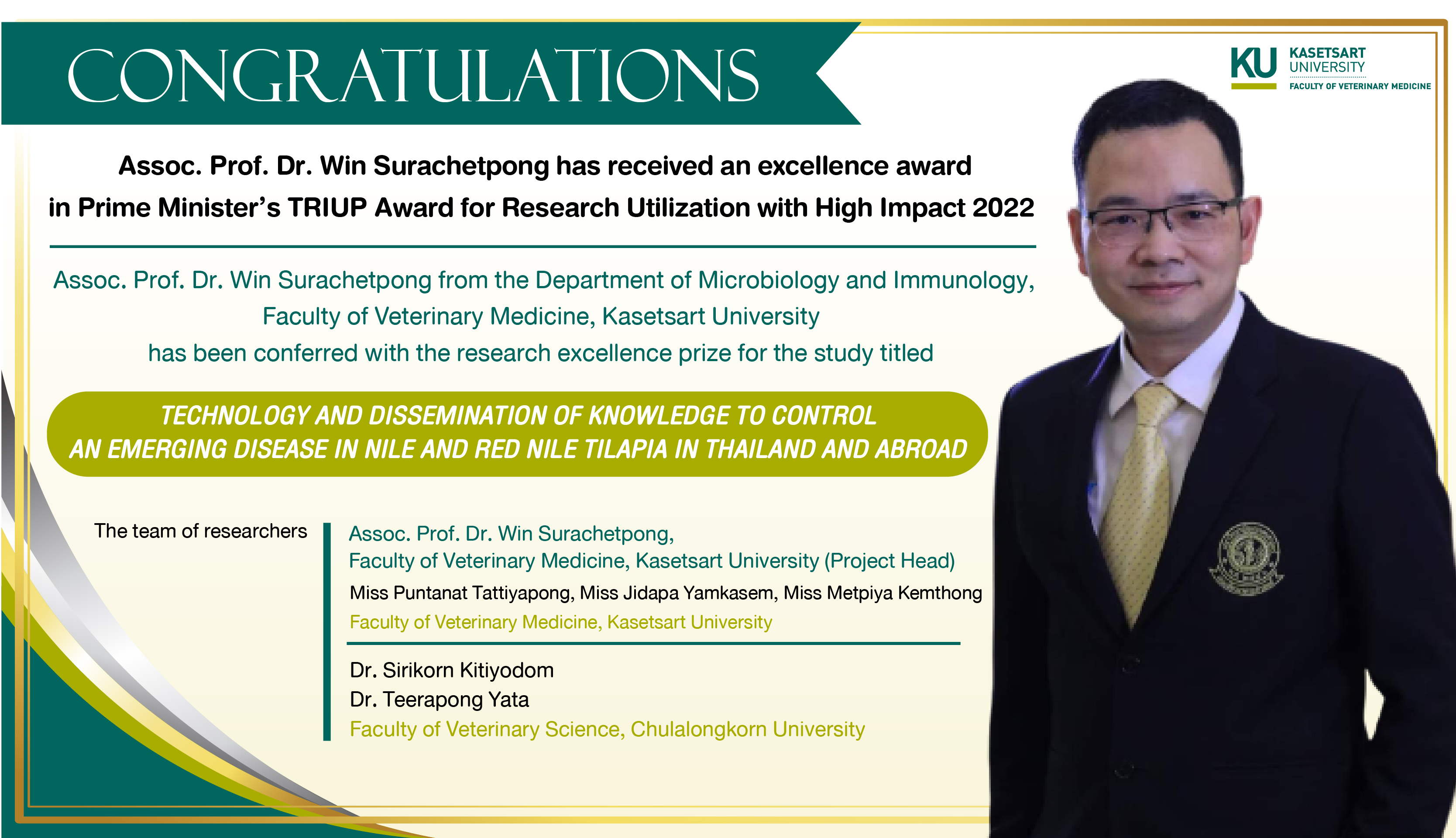
Assoc. Prof. Dr. Win Surachetpong has received an excellence award in Prime Minister’s TRIUP Award for Research Utilization with High Impact 2022.
Assoc. Prof. Dr. Win Surachetpong from the Department of Microbiology and Immunology, Faculty of Veterinary Medicine, Kasetsart University has been conferred with the research excellence prize for the study titled “Technology and Dissemination of Knowledge to Control an Emerging Disease in Nile and Red Nile Tilapia in Thailand and Abroad”. Selected among 119 submissions in the fields of appropriate and deep technology, the contribution made was outstandingly recognized for the former by Prime Minister’s TRIUP Award for Research Utilization with High Impact 2022 organized by Thailand Science Research and Innovation (TSRI). The team of researchers, presented with the plaque and certificate of recognition and monetary reward of 500,000 baht by the Prime Minister and TSRI respectively, include:
- Prof. Dr. Win Surachetpong, Faculty of Veterinary Medicine, Kasetsart University (Project Head)
- Miss Puntanat Tattiyapong, Faculty of Veterinary Medicine, Kasetsart University
- Miss Jidapa Yamkasem, Faculty of Veterinary Medicine, Kasetsart University
- Miss Metpiya Kemthong, Faculty of Veterinary Medicine, Kasetsart University
- Sirikorn Kitiyodom, Faculty of Veterinary Science, Chulalongkorn University
- Teerapong Yata, Faculty of Veterinary Science, Chulalongkorn University
The remarkable effort in appropriate technology is characterized by utilizing complexity analyses and costs that correspond to the operating environment, economic circumstances, society, and culture. It also values the locals’ experience and knowledge as well as their unique community enterprises, as those aspects can be employed to solve problems, promote sustainability, increase competitive edge, and elevate the state of any particular community.
Synopsis of the Study
The technology and study on the emerging virus in Nile Tilapia and Red Nile Tilapia were initiated by the first-time discovery of the microbe in Thailand, its isolation in laboratories, advanced disease diagnosis, mechanisms in pathogenicity and immune response, and sample collection on farms. The practices prompted the application of knowledge and resulted in preventive technology in fish farming such as the examination of antibiotic efficacy, use of probiotics, and antiviral drugs to alleviate the severity of disease. The biosecurity implemented in farm management then suggested the likelihood of viral transmission via water and fish in order to appropriately identify the deterrent measures, thereby curbing the spread from parent fish to their offspring. Moreover, this high-impact research is intended to benefit local farms with low incomes, limited access to cutting-edge technology, but in need of appropriate one. It has a wider impact when breeders are capable of being more independent and reproducing fish with higher rate of survival.
The study, in addition, allows for the development of innovations such as vaccines and test kits that will control and prevent infections. At present, the team of researchers have made progress in immersive nanotechnology vaccine to be used among newborn Nile Tilapia at the highly affordable price of 0.5 baht per fish. Local farmers can thus make easy use of it without resorting to complex and expensive supplies needed for vaccination. It is also found to be effective in increasing the survival rate of the species by 50-70 percent in both in-lab and on-field settings. The commitment to its further development will see Thailand shrink its imports and become more self-reliant.
